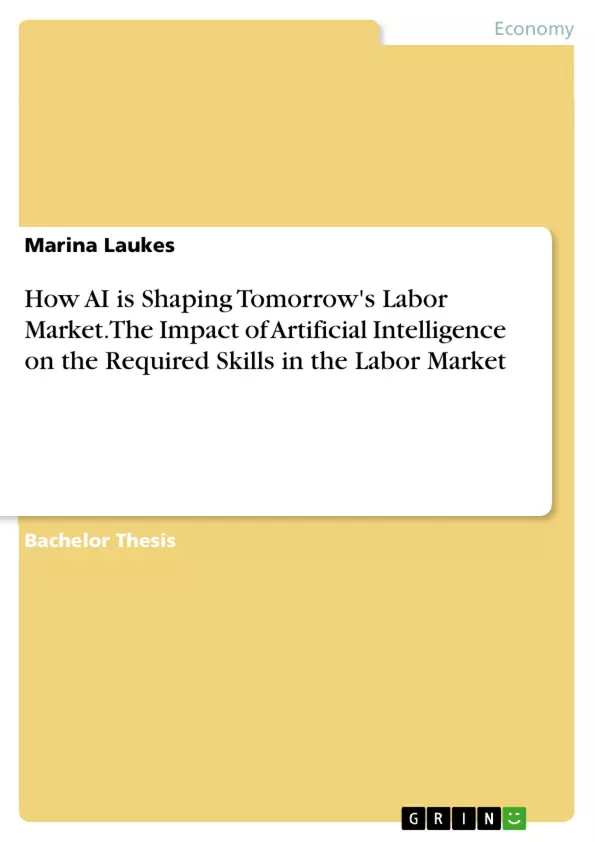The impact of technology on employment and consequently on skills is becoming increasingly apparent, particularly in the use of artificial intelligence. The aim of this bachelor thesis can therefore be divided into two research questions: On the one hand, the aim is to analyze what impact the use of artificial intelligence will have on the labor market. The second question is concerned with the impact artificial intelligence will have on the labor market in terms of the skills required.
In order to provide a profound answer to the research questions, a wide range of literature was used, including books, research studies and use cases. Based on the research questions, the thesis addresses the worldwide AI-driven labor market, identifying both the displacement of human workers and the simultaneous opportunities for new occupations and economic growth. Moreover, a variety of necessary skills are highlighted that are essential for overcoming the dynamic challenges on the labor market posed by AI. Finally, the subsequent analysis of the financial sector and public administration serves to illustrate and clarify the relevance of these skills. Therefore, both knowledge of artificial intelligence and existing human skills are important. Depending on the occupation and task area, the focus of skills is either on the direct application of artificial intelligence or on developing an awareness and understanding of it. It also shows that a wide range of actors, including companies and educational institutions, have a key role to play in the process of adapting workers' skills.
Inhaltsverzeichnis (Table of Contents)
- Introduction
- Goals of the Project and Research Question
- Parameters of Project and State of Current Research
- Overview and Methodology
- Introduction to Artificial Intelligence
- Artificial Intelligence
- Machine Learning
- Deep Learning
- Robotics
- Natural Language Processing
- Generative AI
- Historical Development of Artificial Intelligence
- Economic Effects of Artificial Intelligence on the Labor Market
- Automation and Potential Job Losses
- AI as a Support for Growth
- Emergence of New Occupational Fields
- Skills Required in the Age of AI
- Traditional Skills and their Relevance
- Emerging Skills and their Relevance
- Reskilling and Upskilling
- Analysis of AI's Impact and Skills Requirements in Relevant Sectors
- Finance
- Application of AI in Finance
- Resulting Skill Requirements in Finance
- Public Administration
- Application of AI in Public Administration
- Resulting Skill Requirements in Public Administration
- Finance
Zielsetzung und Themenschwerpunkte (Objectives and Key Themes)
This bachelor thesis investigates the impact of Artificial Intelligence (AI) on the labor market, focusing on the changing skill requirements needed to navigate this evolving landscape. The analysis explores how AI is reshaping job roles, creating new opportunities while potentially displacing existing ones. The study also investigates the essential skills needed for success in an AI-driven economy, analyzing both traditional and emerging skills.
- The impact of AI on the labor market
- The changing skill requirements in an AI-driven economy
- Analysis of AI's application in the finance and public administration sectors
- The role of reskilling and upskilling in adapting to the AI-driven workforce
- The need for both AI knowledge and traditional skills in the labor market
Zusammenfassung der Kapitel (Chapter Summaries)
The thesis begins by introducing the project's goals and research questions, providing context and outlining the methodology used. Chapter 2 explores the fundamentals of AI, delving into its various subfields, such as machine learning, deep learning, robotics, natural language processing, and generative AI, while also tracing its historical development. Chapter 3 examines the economic effects of AI on the labor market, discussing potential job losses due to automation, the potential for AI-driven growth, and the emergence of new occupational fields. Chapter 4 focuses on the skills required in the age of AI, examining both traditional skills and emerging skills, and exploring the importance of reskilling and upskilling. Finally, Chapter 5 analyzes the impact of AI and corresponding skill requirements in the finance and public administration sectors.
Schlüsselwörter (Keywords)
This bachelor thesis focuses on the key terms and concepts of Artificial Intelligence (AI), its impact on the labor market, and the necessary skill requirements for success in an AI-driven economy. These include: AI, machine learning, deep learning, automation, job displacement, economic growth, traditional skills, emerging skills, reskilling, upskilling, finance, public administration, and the broader implications of AI on the future of work.
- Citar trabajo
- Marina Laukes (Autor), 2024, How AI is Shaping Tomorrow's Labor Market. The Impact of Artificial Intelligence on the Required Skills in the Labor Market, Múnich, GRIN Verlag, https://www.grin.com/document/1453310



